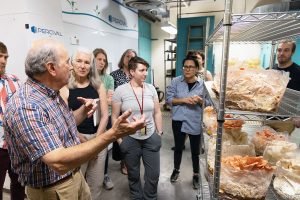In May, after the academic year has come to a close, working professionals and UMN students have a different type of opportunity to hone their public health knowledge. Often hands-on, and always innovative and engaging, the U of M School of Public Health (SPH) Public Health Institute’s (PHI) distinctive learning experiences are offered on a wide range of cutting-edge topics in public health practice. The short-format courses (ranging between 0.5-2 credits) generally include applied experiences such as field trips, case studies, and simulations. Students return each year to build their public health knowledge in a new area, learn best practices, broaden career options, and network with peers.
Collaboration and Innovation
Originally designed in 2002 as a collaboration between SPH, the College of Veterinary Medicine, and the College of Food, Agricultural and Natural Resource Sciences, the institute has changed and grown over the years but the ethos of collaborative teaching and applied experiences has remained constant. For example, last year’s Global Food Systems: Dairy course was co-taught by Minnesota Department of Health Epidemiology and Data Unit Supervisor Stephanie Meyer, SPH Assistant Professor Melanie Firestone, and SPH Professor Craig Hedberg. Their combined backgrounds in research and field experience in food safety ensured that students gained an in-depth understanding about safe agricultural practices and the One Health approach.

“Through the Global Food Systems course, students not only got to see firsthand how a particular item is produced and processed from farm to fork, but also to understand the complexities that go into it,” says Firestone. She also noted that, “One of the unique aspects of the Global Food Systems courses is the team-based approach to learning. All of the instructors currently or previously worked in outbreak detection and response.”
Executive Public Health Administration & Policy MPH student Kat Gonzales enrolled in the global food systems course, which included a field trip to a working goat dairy farm, to better connect how food systems impact health and the environment. “The course definitely gave me a comprehensive understanding of the interconnections between agriculture, food safety, zoonotic diseases, antibiotic resistance, environmental sustainability, and nutrition,” she says, adding that she received a scholarship to advance her professional knowledge.
Serving the Public Health Workforce
“We do have scholarships available for working professionals to continue to stay current on best practices in public health,” says PHI Director Meghan Taylor. In fact, of the 219 students who attended the institute last year, 44 percent were working professionals, and 72 participants received a scholarship. Many of the courses are offered in an online format to serve professionals outside of the Twin Cities.
There is a high demand for courses that offer insight into critical areas in public health that are often not covered in the standard curriculum, such as “Public Health Law” and “Risk Communication,” which are two of the most popular courses each year.
“Public Health Law challenged my perspective on public health activities as they relate to the law,” says SPH doctoral student Lexi Edmundson, who specifically chose courses to advance her understanding of public health issues in new areas. “In particular, I gained a much deeper understanding of the legal frameworks involved in public health action, and how finding the balance between public health action and protecting personal liberties has played a role in governmental response to public health issues,” she says.
On Trend
Classes are added to the roster each year based on trending topics in public health and student demand. For example, last year’s offerings included a new course on cannabis, In the Weeds: The Regulatory History and Future of Cannabis in Public Health, which is especially relevant as recreational cannabis was legalized last year in Minnesota. Other courses added because of student interest included LGBTQ Health & Policy and Fungi Magic: An Exploration of Historic and Current Roles of Mushrooms in Health and Preventing Diseases of Humans, Animals, Plants, and the Environment.
“The Public Health Institute has become a testing ground for new courses,” says Taylor about PHI’s track record as an incubator for new and innovative courses for SPH’s regular curriculum. It’s evidence of PHI’s reputation for hosting some of the most topical, experiential–and fun–courses that are offered by SPH each year.

Nutrition MPH student Amelia Starr took both the Fungi Magic and cannabis courses because they aligned to her professional interests. “By applying research-based evidence to the coursework, these classes absolutely advanced my understanding of these highly relevant and often misunderstood topics,” she says. “Topic experts were also brought into class as guest speakers which further rounded out the experience and educational value of the courses.”
Beyond exposure to new concepts and experiential activities, students also have a unique opportunity to learn from their peers.
“What makes PHI particularly unique is the combination of students and established health professionals; some individuals are taking these courses for credit and others for ongoing education and developing interests. This ensured a diverse mix of academic disciplines, backgrounds, interests, ages, and stages of career paths which was beneficial to learning overall and provided educational experiences outside of the curriculum itself,” says Starr. “It allowed me the opportunity to interact, network, and establish connections with other students, members of the community, and PH professionals that I would not otherwise have in my particular degree program.
Whether it is learning from experts in the field, peers with diverse perspectives, or research faculty, PHI students can be sure to come away with an expanded knowledge base about some of the most interesting topics in public health today. Enroll in summer 2024 courses now.

